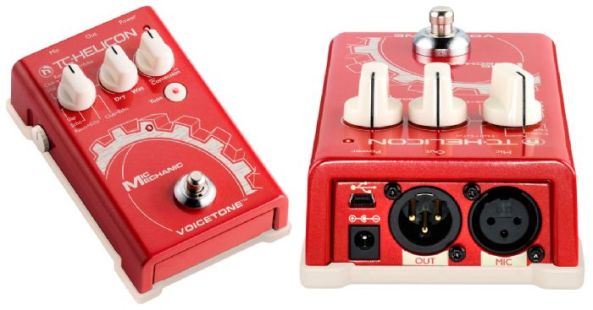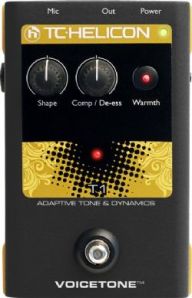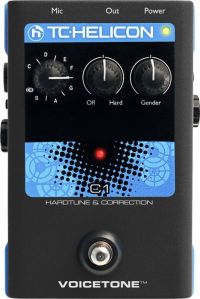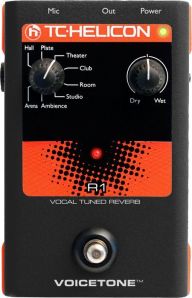Hi everybody, Brian from World Music Supply here again, and today I get to talk to you about three new pedals from TC helicon, the Mic Mechanic, and the Voicelive Play and GTX, all of which are surprisingly affordable, and amazingly versatile. TC Helicon has again and again reinvented the technology that a singer can take into the studio, and most importantly, on stage with them. From their Voicelive 1 and 2 to their voice tone singles I reviewed a few weeks ago, they just know what a singer needs on stage with them, from guitar controlled harmonies, to pitch correction that you can turn on and off with a button mounted on a microphone, they just get singers.
So without further ado, let’s check out the first pedal in today’s round up, the Mic Mechanic which does a lot of different things, but what it does best is makes you sound better. There are a lot of useful little features so I’m going to review them as best I can piece by piece, first there are eight different reverbs and delays, which can all be controlled via tap tempo. They do a great job of just widening your voice, and helping to fill out the audio spectrum. Next, there is of course pitch correction, which is all the rage nowadays. This pedal can do hard tuning to get that robot effect, but I ended up leaving it on a softer tuning setting which did a great job of just picking up the slack for me, when I wasn’t really on pitch, but wasn’t super off either. This setting can sound super natural, but as I mentioned, it can still do that hard tuning thing and anything in between.
Everything on this pedal can be turned on and off with the TC Helicon MP-75 microphone, just like the singles, although odds are, this pedal will almost always be on. Why you ask? Because this pedal might do a lot of different, useful, and sometimes gimmicky effects, but this pedal also has a button on it that just says “Tone”, and that is a fairly accurate explanation of what it does. It takes your voice, and just makes it more tuneful, it’s a combination adaptive EQ, Compressor, De-esser and noise gate. It takes the rather flat response of a typical dynamic mic, and just makes it a little punchier, a little more sparkly, and just a lot better all around. It’s really one of those duh kind of pedals, like, why didn’t someone make this before? Why is this just now a thing?
So at the end of the day, the Mic Mechanic just does what you really need it to, sure it has some little tricks up its sleeves like reverb, delay, and some pitch correction, but if you use them sparingly with the tone button, you will instantly have better sounding vocals. There really isn’t any way to phrase it but better, sure they’re a little punchier, a little thicker, but at the end of the day, you’ll just sound better, and for that the Mic Mechanic easily snags a 10 out of 10. No bells, no whistles, just better vocals.
Next up are the Voice live Play pedals, the standard, and the GTX. Both of which feature the same vocal effects engine, the only real difference is the fact that the GTX features amp and cabinet modeling and effects and the color of the housing is white instead of blue. The Voice live play pedals feature all of the effects that I discussed with the voice tone singles, and of the Mic Mechanic. The difference is, is that these can be organized according to songs, and controlled with either the hit function on the pedal housing, or the button on the MP-75 Mic. The abilities that lay inside of the Voice live play would take weeks to properly explain, from its myriad of tone controls, harmonies, auto tuning, reverbs and delays, doubling, and that’s not even scratching the surface.
The pedal also comes loaded with a wide array of presets all based on famous songs, which would be great for anyone from cover bands to people who just want that sound for themselves. This feature is expanded upon when you factor in the fact that the GTX is also loaded with guitar effects, so now your guitar is running through an effects chain to imitate the given song. You can also program your own presets, or download presets from TC helicon to suit literally any musical need you could come up against.
The Voice live play’a and the Voice live play GTX are also equipped with internal microphones that can be used to track the key, and chords for the vocal harmonies, this is great as now you dont have to just play chords the entire song, so that the pedal can track the chords, instead you can just play your part, and as long as the chords are being suggested by all of the notes of the band, the harmonies will track just fine. These two pedals are easily two of the most versatile little processors I’ve ever seen, they take all of the power and raw brawn of the Voice Live 2, and shoves it in a simple three button package. For this fact alone the Voice Live Plays both get a 10 out of 10, because these are just phenomenal pedals for any gigging vocalist.










